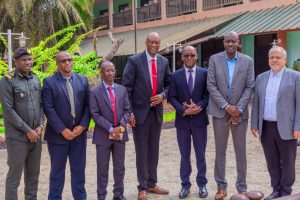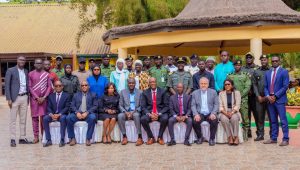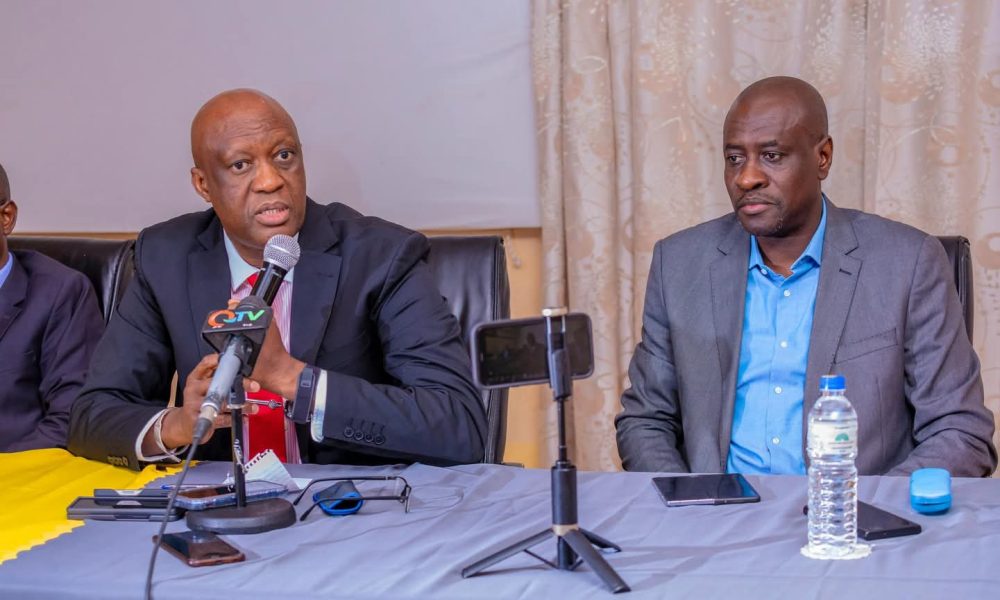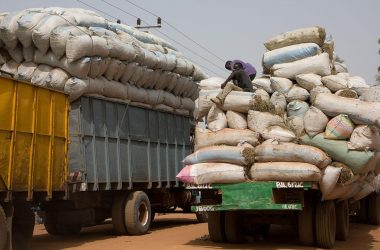The Commissioner General of the Gambia Revenue Authority (GRA), Hon. Yankuba Darboe, on Tuesday told participants of a five-day inter-agency workshop on coordinated border management that The Gambia government has recognized the need for the prioritization of integrated border management as an integral part of trade facilitation.
Participants drawn from, inter alia, Customs, the Gambia Police Force, the Gambia Immigration Department, Drugs Law Enforcement Agency, General Transport Union, Food Safety and Quality Authority and Ministry of trade are meeting to finalize the draft of the inter-agency Coordinated Border Management (CBM) framework on data standardization and its alignment with the WCO data model.
In opening remarks at the workshop currently underway at the Senegambia hotel, the head of The Gambia’s main revenue collection agency said:”The Government of The Gambia has recognized Coordinated Border Management (CBM) as a key trade facilitation priority, aiming to enhance border efficiency, streamline trade processes, and strengthen inter-agency coordination.”
CG Darboe informed the participants that the GRA has developed a Draft Strategy for 2025-2029, focussing on lubricating trade and modernizing border management practices as part of the Authority’s broader efforts to lend support to The Gambia government for the realization of its objective.
“Since 2021, the WCO Accelerate Trade Facilitation Programme has been working with The Gambia to support Trade Facilitation Agreement (TFA) implementation, with a focus on CBM, Time Release Study (TRS), Authorized Economic Operator (AEO), the national Customs Enforcement Network, and the Performance Measurement mechanism (PMM) system,” CG Darboe stated.
He informed the participants that “based on WCO assessments, border delays, complex procedures, and lack of coordination among multiple regulatory agencies remain areas for improvement”. “Currently, 6 to 10 government agencies operate at the borders, depending on the port, including: Customs, Immigration, Department of Agriculture, Livestock, Police Force, Food Safety and Quality Authority among others. The implementation of CBM reforms is crucial to overcoming these challenges, ensuring efficient border operations, reducing trade costs, and fostering economic growth in The Gambia,” he added.
CG Darboe, however, pointed out that despite ongoing efforts by various border agencies, practical knowledge of CBM’s implementation is lacking.
“While approaches are being developed by various border agencies, practical knowledge of CBM implementation is lacking. Therefore, the Gambia Revenue Authority has indicated the following areas that need support in terms of capacity-building: Standardize border agencies operating procedures, provide capacity-building for drafting the Standard Operating Procedures for CBM, harmonize data elements for efficient data exchange, contribute to the development of integrated risk management for border agencies,” he explained, highlighting that:”By streamlining and aligning border procedures and processes, customs and other border agencies in The Gambia can create a common set of rules, documentation requirements, and data formats for standard regulation on CBM. “Standardization of procedures facilitates seamless flow of the goods at the ports of entry as it enables seamless information exchange, data sharing among the agencies and clearance of goods.”

Darboe informed his audience that the draft inter-agency standard operations framework on CBM was developed from 7th April to 8th April by the inter-agency working group that consisted of representatives from different border and regulatory agencies. The crafting of the draft, he further explained, was done through virtual capacity-building sessions that the representatives had with WCO experts from Zambia, Eswatini and Namibia. “The draft Interagency Standards Operations Framework on CBM detailed the legal basis, scope of CBM, competence and functions of border agencies, functions of GRA as a lead agency for coordinating operations, technical guidelines for standard operating procedures for border agencies at the ports of entry,operating procedures for physical flow of goods, sequence and duration of control operations by border agencies, delegated functions undertaken by border agencies stationed at the ports of entry and procedures on collection of all agency fees through single payment point.”
CG Darboe went on to enumerate that the draft interagency standards operations framework on CBM also detailed provisions on expedited clearance and passage (General order & Electronic Queue System, Perishable, Hazardous and Dangerous Goods, AEO, etc.),operating days and hours documented and inspection procedures by border agencies.”

He concluded his statement by highlighting that “providing capacity-building to GRA on drafting the Inter-Agency framework on CBM for all ports of entry will form the basis for CBM Standard Operating Procedures for each port of entry in The Gambia, which can be undertaken further by the NTFC Secretariat and Border Agencies.”
Speaking earlier, Mr. Jim Clarke of WCO described coordinated border management as a critical aspect of trade facilitation which, he added, lays the foundation for enhanced trade facilitation.

He underlined the importance of information-sharing between border agencies “so that trade will flow smoothly while safeguarding revenue for The Gambia”.





